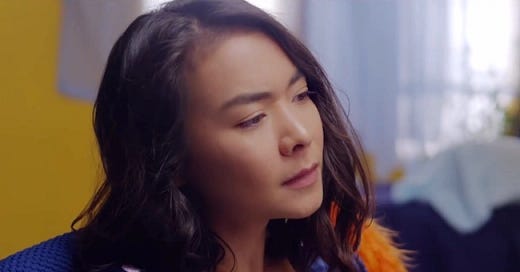Mitski’s “Nobody” is well-loved, and potentially her most well-known song. While it did not place on the Billboard charts, it has earned several trends on Tiktok and has over 265 million streams on Spotify. With its catchy and dizzying hook, poetic lyrics, and Mitski’s raw vocal performance, the indie pop song subverts genre conventions by putting its vulnerability on full display.
Typically, mainstream pop songs are about love and relationships. But in “Nobody” Mitski emphatically declares that she has nobody to love her. Her opening lyrics are my God, I’m so lonely/so I open up the window/to hear sounds of people, signifying how she is so alone that she can only experience social interaction by observing people outside– Mitski herself feels like an outsider because of this. Mitski wants somebody, anybody to see her, want her, and end her loneliness. These sad lyrics seem misplaced against the funky guitar and upbeat melody she sings over, but the contrast only highlights the misery of Mitski’s words.
All of the self-help books and articles and videos tell us that we don’t deserve love until we love ourselves. Mitski is keenly aware of this pressure and remarks in one verse: “And I don’t want your pity/ I just want somebody near me/ guess I’m a coward/I just want to feel alright.” But for many people, loneliness is out of our control. It is brought about by a lack of access to community care, sense of estrangement and marginalization by society. In her Genius interview, while explaining the lyrics I’ve been big and small/and big and small/and big and small again/and still nobody wants me, Mitski explained that she has lost weight, gained weight, and attempted to change herself to fit into an ideal that would supposedly make her more desirable to someone, but it didn’t work. It would be remiss of me to not note that Mitski is a woman of color (half-Japanese) and that her racial identity absolutely impacts how she is perceived in this world. People of color face racism and fetishization in the dating pool, and when you are a person of color with multiple categories of marginalization (fat, disabled, LGBTQ+, etc.) it can make searching for companionship that much more isolating. As a medium sized queer Black woman from the American South, I am especially cognizant of these issues and feeling like an “other.”
The state of aloneness can only be ended by the company of another person, preferably someone compassionate and understanding. While we will never be able to escape ourselves, it is unfair to put the burden of being loved on one individual, especially when some individuals are taught to hate themselves from birth. In the lyrics where Mitski expresses how her attempts of attracting somebody through changing her body failed, she tells us that she has worked on herself and it has gotten her nowhere, no one. She is still alone.
Mitski goes from refusing pity to nearly begging in this next verse: And I know no one will save me/ I’m just asking for a kiss/ give me one good movie kiss/ and I’ll be alright. By her saying that she knows no one will save her, she is surrendering to her helplessness. The loneliness is getting worse, and she is asking for somebody to finally end it with one kiss full of love to last her the rest of her days. As we exit the bridge, Mitski is saying “nobody” repeatedly, quietly, almost as if to herself instead of the listener she’s been addressing up until this point. Her voice sounds as if she is detaching it from her being– now she is removed not only from her society, but herself. Her body. She is fading away. “No-bod-y” we hear her sing softly as if she is laying down and staring up at the ceiling, exhausted after a long day of looking for love. A piano plays a slow and unresolving chord.
I was 16 when this song came out, and now I’m 20. I have never been loved before.
Mitski, I too, am exhausted by my own yearning.




fantastic i cried i laughed i screamed i jumped for joy i threw up i died then came back to life again